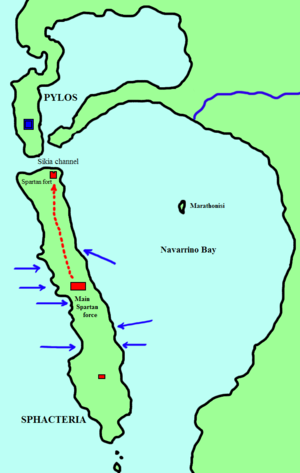Battle of Sphacteria
| Battle of Sphacteria | |||||||
|---|---|---|---|---|---|---|---|
| Part of the Peloponnesian War | |||||||
 |
|||||||
|
|||||||
| Belligerents | |||||||
| Athens | Sparta | ||||||
| Commanders and leaders | |||||||
|
Demosthenes, Cleon |
Epitadas †, Hippagretas, Styphon |
||||||
| Strength | |||||||
| 3,000+ soldiers, 8,000 lightly armed rowers |
440 | ||||||
| Casualties and losses | |||||||
| About 230 | 148 killed, Remainder captured |
||||||
The Battle of Sphacteria was a land battle of the Peloponnesian War, fought in 425 BC between Athens and Sparta. Following the Battle of Pylos and subsequent peace negotiations, which failed, a number of Spartans were stranded on the island of Sphacteria. An Athenian force under Cleon and Demosthenes attacked and forced them to surrender.
In the wake of the failed peace negotiations, Demosthenes initially attempted to starve out the Spartans on Sphacteria, but was unable to blockade the island tightly enough. In Athens there was concern that the approach of winter would necessitate abandoning the blockade, unless the impasse was swiftly broken. The politician Cleon took out reinforcements from Athens and joined forces with Demosthenes, and the Athenians launched an assault on Pylos. Landing in great force on a weakly defended point, the Athenians swamped the beachfront defenses and moved inland, harassing the Spartans with missile fire whenever they attempted to come to grips with the Athenian hoplites. The Spartans retreated to the northern end of the island and dug in behind their fortifications, but when the Messenian general Comon succeeded in bringing his troops through seemingly impassable terrain into their rear, the Spartans surrendered.
The capture of over 292 hoplites (120 of which were Spartans) by Athens radically shifted the balance of power in the war. Athens threatened to execute its prisoners if Sparta invaded Attica, and the annual invasions which had occurred since the war's declaration were thus halted. Athens, meanwhile, with increased prestige and confidence, went on to pursue the war with more vigor and initiative for several years, returning to the negotiating table only after a string of defeats had eroded its position.
After the Battle of Pylos, which resulted in the isolation of over 400 Spartan soldiers on the island of Sphacteria, Sparta sued for peace, and, after arranging an armistice at Pylos by surrendering the ships of the Peloponnesian fleet as security, sent an embassy to Athens to negotiate a settlement. These negotiations, however, proved fruitless, and with the news of their failure the armistice came to an end; the Athenians, however, refused to return the Peloponnesian ships, alleging that assaults had been made against their fortifications during the truce. Hostilities resumed immediately, with the Athenians guarding the island night and day against attempts at rescue or resupply.
...
Wikipedia
